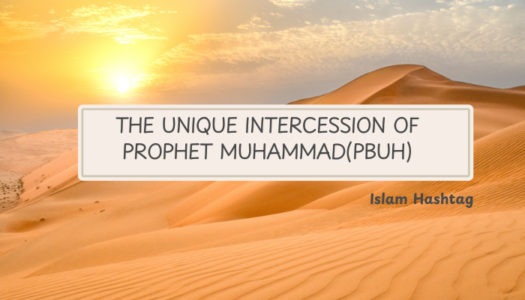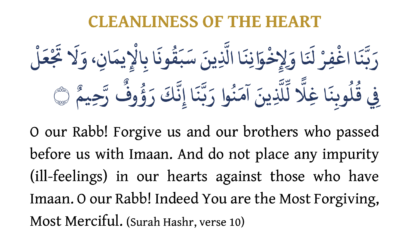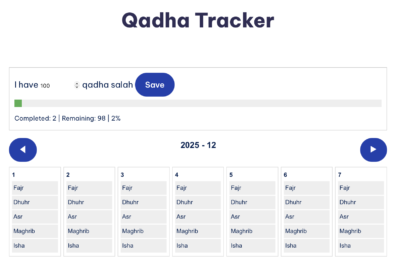The Unique intercession of prophet Muhammad (Sallallahu Alaihe Wasallam) on day of judgement
The Unique Status of Rasulullah (Sallallahu Alaihe Wasallam) and His Intercession
In this article we will read about the unique status of Prophet Muhammad (Sallallahu Alaihe Wasallam) on the Day of Judgment and his exclusive role in interceding for humanity as described in a powerful hadith from Saheeh al-Bukhari. Learn how his intercession will bring relief to his Ummah.
Hadhrat Abu Hurairah (Radi Allahu Anhu) narrates a profound Hadith in which Rasulullah (Sallallahu Alaihe Wasallam) shares an extraordinary event about the Day of Judgment. In this narration, the unique status of Rasulullah (Sallallahu Alaihe Wasallam) and his exclusive role in interceding for humanity is highlighted, emphasizing his distinction among all the Prophets (Alaihimus Salaam).
The Day of Judgment: A Time of Intense Distress
On the Day of Qiyamah, humanity will face unimaginable hardship. ALLAH will gather all of creation—from the first human being to the last—on a single plain. The sun will draw close, and the overwhelming heat and distress will cause people to panic. In their desperation, they will seek someone to intercede for them before ALLAH to ease their suffering.
Seeking Intercession from the Prophets (Alaihimus Salaam)
The people will first approach Hadhrat Aadam (Alaihis Salaam), the father of mankind. They will plead with him to intercede, reminding him of his esteemed status as the first human created by ALLAH’s hands. However, Hadhrat Aadam (Alaihis Salaam) will excuse himself, saying that he is preoccupied with his own shortcomings, particularly his disobedience in eating from the forbidden tree. He will tell them to go to Hadhrat Nuh (Alaihis Salaam).
When they approach Hadhrat Nuh (Alaihis Salaam), the first Messenger sent to humanity and a beloved servant of ALLAH, he will also express concern for himself, explaining that he used his only guaranteed supplication against his nation. He, too, will direct them elsewhere—to Hadhrat Ibraheem (Alaihis Salaam).
Hadhrat Ibraheem (Alaihis Salaam), the close friend (Khaleel) of ALLAH, will acknowledge the gravity of the situation but will be concerned for himself due to mistakes he made during his lifetime. He will suggest they approach Hadhrat Moosa (Alaihis Salaam).
Hadhrat Moosa (Alaihis Salaam), who received the Torah and spoke directly with ALLAH, will recall an incident from his life when he took a life unintentionally, and he, too, will express his inability to intercede. He will tell them to go to Hadhrat Isa (Alaihis Salaam).
Hadhrat Isa (Alaihis Salaam), the Prophet who was born miraculously and spoke from the cradle, will also decline to intercede, stating that he is preoccupied with the seriousness of the Day.
The Exclusive Intercession of Rasulullah (Sallallahu Alaihe Wasallam)
Finally, the people will come to Rasulullah (Sallallahu Alaihe Wasallam). They will remind him of his honored status as the final Messenger and the one whose sins have been forgiven. Upon hearing their pleas, Rasulullah (Sallallahu Alaihe Wasallam) will prostrate beneath ALLAH’s Throne and praise Him with words that no one else has been taught. ALLAH will then permit him to intercede, saying, “O Muhammad, raise your head. Ask and it will be granted, intercede, and your intercession will be accepted.”
Rasulullah (Sallallahu Alaihe Wasallam) will then pray for his Ummah. ALLAH will accept his intercession, and those among his Ummah who are free from accountability will be granted entry into Jannah through the gates of their choice. This moment, known as the Shafaa’at al-Kubra (the Grand Intercession), is reserved exclusively for Rasulullah (Sallallahu Alaihe Wasallam).
Hadith on Intercession of Prophet
حَدَّثَنِي مُعَاذُ بْنُ فَضَالَةَ، حَدَّثَنَا هِشَامٌ، عَنْ قَتَادَةَ، عَنْ أَنَسٍ، أَنَّ النَّبِيَّ صلى الله عليه وسلم قَالَ ” يَجْمَعُ اللَّهُ الْمُؤْمِنِينَ يَوْمَ الْقِيَامَةِ كَذَلِكَ فَيَقُولُونَ لَوِ اسْتَشْفَعْنَا إِلَى رَبِّنَا حَتَّى يُرِيحَنَا مِنْ مَكَانِنَا هَذَا. فَيَأْتُونَ آدَمَ فَيَقُولُونَ يَا آدَمُ أَمَا تَرَى النَّاسَ خَلَقَكَ اللَّهُ بِيَدِهِ وَأَسْجَدَ لَكَ مَلاَئِكَتَهُ وَعَلَّمَكَ أَسْمَاءَ كُلِّ شَىْءٍ، شَفِّعْ لَنَا إِلَى رَبِّنَا حَتَّى يُرِيحَنَا مِنْ مَكَانِنَا هَذَا. فَيَقُولُ لَسْتُ هُنَاكَ ـ
وَيَذْكُرُ لَهُمْ خَطِيئَتَهُ الَّتِي أَصَابَ ـ وَلَكِنِ ائْتُوا نُوحًا، فَإِنَّهُ أَوَّلُ رَسُولٍ بَعَثَهُ اللَّهُ إِلَى أَهْلِ الأَرْضِ. فَيَأْتُونَ نُوحًا فَيَقُولُ لَسْتُ هُنَاكُمْ ـ وَيَذْكُرُ خَطِيئَتَهُ الَّتِي أَصَابَ ـ وَلَكِنِ ائْتُوا إِبْرَاهِيمَ خَلِيلَ الرَّحْمَنِ. فَيَأْتُونَ إِبْرَاهِيمَ فَيَقُولُ لَسْتُ هُنَاكُمْ ـ وَيَذْكُرُ لَهُمْ خَطَايَاهُ الَّتِي أَصَابَهَا ـ وَلَكِنِ ائْتُوا مُوسَى عَبْدًا أَتَاهُ اللَّهُ التَّوْرَاةَ وَكَلَّمَهُ تَكْلِيمًا ـ فَيَأْتُونَ مُوسَى فَيَقُولُ لَسْتُ هُنَاكُمْ ـ وَيَذْكُرُ لَهُمْ خَطِيئَتَهُ الَّتِي أَصَابَ ـ وَلَكِنِ ائْتُوا عِيسَى عَبْدَ اللَّهِ وَرَسُولَهُ وَكَلِمَتَهُ وَرُوحَهُ. فَيَأْتُونَ عِيسَى فَيَقُولُ لَسْتُ هُنَاكُمْ وَلَكِنِ ائْتُوا مُحَمَّدًا صلى الله عليه وسلم عَبْدًا غُفِرَ لَهُ مَا تَقَدَّمَ مِنْ ذَنْبِهِ وَمَا تَأَخَّرَ.
فَيَأْتُونِي فَأَنْطَلِقُ فَأَسْتَأْذِنُ عَلَى رَبِّي فَيُؤْذَنُ لِي عَلَيْهِ، فَإِذَا رَأَيْتُ رَبِّي وَقَعْتُ لَهُ سَاجِدًا فَيَدَعُنِي مَا شَاءَ اللَّهُ أَنْ يَدَعَنِي ثُمَّ يُقَالُ لِي ارْفَعْ مُحَمَّدُ، وَقُلْ يُسْمَعْ، وَسَلْ تُعْطَهْ، وَاشْفَعْ تُشَفَّعْ. فَأَحْمَدُ رَبِّي بِمَحَامِدَ عَلَّمَنِيهَا، ثُمَّ أَشْفَعُ فَيَحُدُّ لِي حَدًّا فَأُدْخِلُهُمُ الْجَنَّةَ، ثُمَّ أَرْجِعُ فَإِذَا رَأَيْتُ رَبِّي وَقَعْتُ سَاجِدًا، فَيَدَعُنِي مَا شَاءَ اللَّهُ أَنْ يَدَعَنِي ثُمَّ يُقَالُ ارْفَعْ مُحَمَّدُ، وَقُلْ يُسْمَعْ، وَسَلْ تُعْطَهْ، وَاشْفَعْ تُشَفَّعْ، فَأَحْمَدُ رَبِّي بِمَحَامِدَ عَلَّمَنِيهَا رَبِّي ثُمَّ أَشْفَعُ فَيَحُدُّ لِي حَدًّا فَأُدْخِلُهُمُ الْجَنَّةَ، ثُمَّ أَرْجِعُ فَإِذَا رَأَيْتُ رَبِّي وَقَعْتُ سَاجِدًا، فَيَدَعُنِي مَا شَاءَ اللَّهُ أَنْ يَدَعَنِي ثُمَّ يُقَالُ ارْفَعْ مُحَمَّدُ، قُلْ يُسْمَعْ، وَسَلْ تُعْطَهْ، وَاشْفَعْ تُشَفَّعْ، فَأَحْمَدُ رَبِّي بِمَحَامِدَ عَلَّمَنِيهَا،
ثُمَّ أَشْفَعُ فَيَحُدُّ لِي حَدًّا فَأُدْخِلُهُمُ الْجَنَّةَ، ثُمَّ أَرْجِعُ فَأَقُولُ يَا رَبِّ مَا بَقِيَ فِي النَّارِ إِلاَّ مَنْ حَبَسَهُ الْقُرْآنُ وَوَجَبَ عَلَيْهِ الْخُلُودُ ”. قَالَ النَّبِيُّ صلى الله عليه وسلم ” يَخْرُجُ مِنَ النَّارِ مَنْ قَالَ لاَ إِلَهَ إِلاَّ اللَّهُ. وَكَانَ فِي قَلْبِهِ مِنَ الْخَيْرِ مَا يَزِنُ شَعِيرَةً، ثُمَّ يَخْرُجُ مِنَ النَّارِ مَنْ قَالَ لاَ إِلَهَ إِلاَّ اللَّهُ. وَكَانَ فِي قَلْبِهِ مِنَ الْخَيْرِ مَا يَزِنُ بُرَّةً، ثُمَّ يَخْرُجُ مِنَ النَّارِ مَنْ قَالَ لاَ إِلَهَ إِلاَّ اللَّهُ. وَكَانَ فِي قَلْبِهِ مَا يَزِنُ مِنَ الْخَيْرِ ذَرَّةً ”.
Narrated Anas:
The Prophet (ﷺ) said, “Allah will gather the believers on the Day of Resurrection in the same way (as they are gathered in this life), and they will say, ‘Let us ask someone to intercede for us with our Lord that He may relieve us from this place of ours.’
Then they will go to Adam and say, ‘O Adam! Don’t you see the people (people’s condition)? Allah created you with His Own Hands and ordered His angels to prostrate before you, and taught you the names of all the things. Please intercede for us with our Lord so that He may relieve us from this place of ours.’ Adam will say, ‘I am not fit for this undertaking’ and mention to them the mistakes he had committed, and add, “But you d better go to Noah as he was the first Apostle sent by Allah to the people of the Earth.’
They will go to Noah who will reply, ‘I am not fit for this undertaking,’ and mention the mistake which he made, and add, ‘But you’d better go to Abraham, Khalil Ar-Rahman.’
They will go to Abraham who will reply, ‘I am not fit for this undertaking,’ and mention to them the mistakes he made, and add, ‘But you’d better go to Moses, a slave whom Allah gave the Torah and to whom He spoke directly’ They will go to Moses who will reply, ‘I am not fit for this undertaking,’ and mention to them the mistakes he made, and add, ‘You’d better go to Jesus, Allah’s slave and His Apostle and His Word (Be: And it was) and a soul created by Him.’
They will go to Jesus who will say, ‘I am not fit for this undertaking, but you’d better go to Muhammad whose sins of the past and the future had been forgiven (by Allah).’ So they will come to me and I will ask the permission of my Lord, and I will be permitted (to present myself) before Him.
When I see my Lord, I will fall down in (prostration) before Him and He will leave me (in prostration) as long as He wishes, and then it will be said to me, ‘O Muhammad! Raise your head and speak, for you will be listened to; and ask, for you will be granted (your request); and intercede, for your intercession will be accepted.’
I will then raise my head and praise my Lord with certain praises which He has taught me, and then I will intercede. Allah will allow me to intercede (for a certain kind of people) and will fix a limit whom I will admit into Paradise. I will come back again, and when I see my Lord (again), I will fall down in prostration before Him, and He will leave me (in prostration) as long as He wishes, and then He will say, ‘O Muhammad! Raise your head and speak, for you will be listened to; and ask, for you will be granted (your request); and intercede, for your intercession will be accepted.’
I will then praise my Lord with certain praises which He has taught me, and then I will intercede. Allah will allow me to intercede (for a certain kind of people) and will fix a limit to whom I will admit into Paradise, I will return again, and when I see my Lord, I will fall down (in prostration) and He will leave me (in prostration) as long as He wishes, and then He will say, ‘O Muhammad! Raise your head and speak, for you will be listened to, and ask, for you will be granted (your request); and intercede, for your intercession will be accepted.’
I will then praise my Lord with certain praises which He has taught me, and then I will intercede. Allah will allow me to intercede (for a certain kind of people) and will fix a limit to whom I will admit into Paradise. I will come back and say, ‘O my Lord! None remains in Hell (Fire) but those whom Qur’an has imprisoned therein and for whom eternity in Hell (Fire) has become inevitable.’
” The Prophet (ﷺ) added, “There will come out of Hell (Fire) everyone who says: ‘La ilaha illal-lah,’ and has in his heart good equal to the weight of a barley grain. Then there will come out of Hell (Fire) everyone who says: ‘ La ilaha illal-lah,’ and has in his heart good equal to the weight of a wheat grain. Then there will come out of Hell (Fire) everyone who says: ‘La ilaha illal-lah,’ and has in his heart good equal to the weight of an atom (or a smallest ant).(Sahih Bukhari 7410)
Lessons from the Hadith of Unique intercession of prophet Muhammad
This Hadith beautifully illustrates the unique and unmatched status of Rasulullah (Sallallahu Alaihe Wasallam) among all creation. When even the greatest Prophets express their inability to intercede due to the overwhelming severity of the Day of Judgment, Rasulullah (Sallallahu Alaihe Wasallam) will step forward to seek mercy for his Ummah. His concern for his followers and his closeness to ALLAH exemplify his unique role as the greatest of all Prophets.
Conclusion
This narration reminds us of the special connection we have with Rasulullah (Sallallahu Alaihe Wasallam). His concern for his Ummah, both in this world and the Hereafter, is a source of hope for all believers. As we strive to follow his Sunnah, may we be granted his intercession on the Day of Judgment and be among those who enter Jannah by his Shafaa’ah.
May ALLAH Ta’ala grant us the ability to follow the teachings of Rasulullah (Sallallahu Alaihe Wasallam) and be among those who receive his intercession on the Day of Qiyamah. Ameen.
Share this post- intercession of prophet Muhammad (Sallallahu Alaihe Wasallam)
Discover more from Islam Hashtag
Subscribe to get the latest posts sent to your email.






